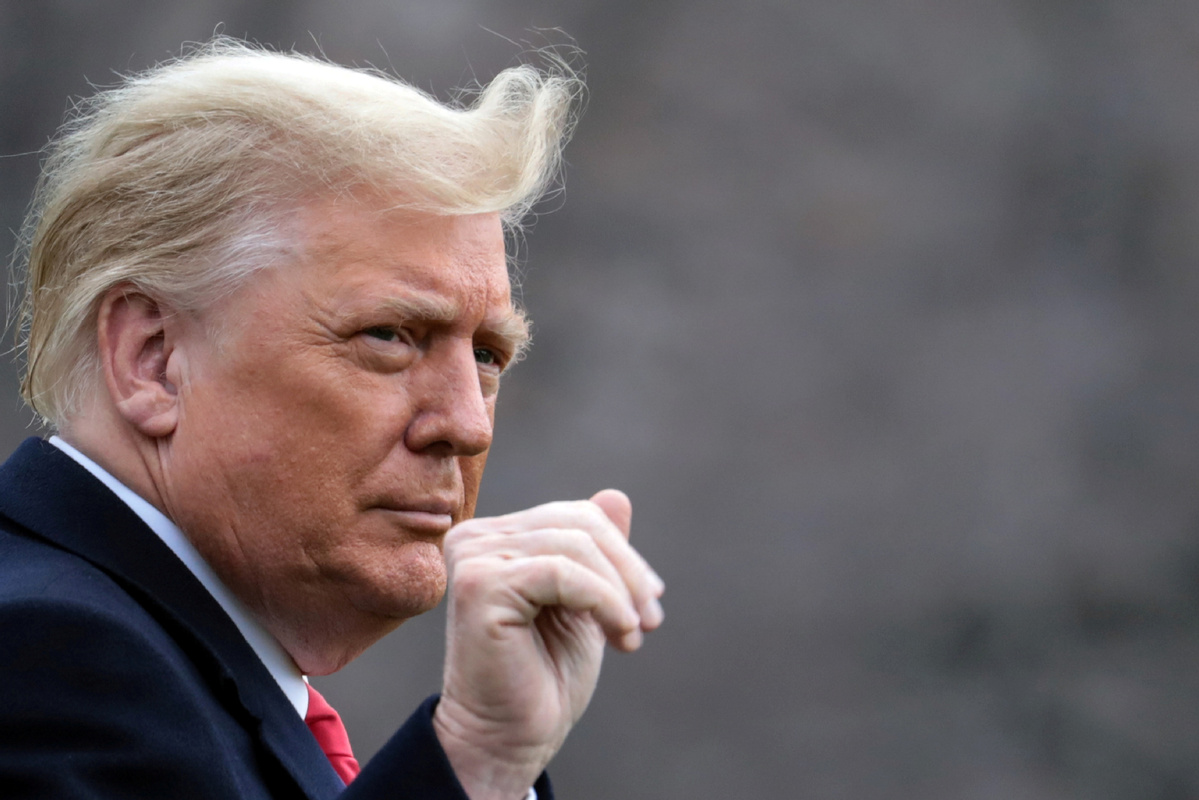Democrats mull second Trump impeachment
By AI HEPING in New York | CHINA DAILY | Updated: 2021-01-11 06:56

Democrats in the US House of Representatives say they will introduce an article of impeachment against President Donald Trump on Monday, charging him with "incitement of insurrection" for encouraging the mob that stormed the Capitol on Wednesday as a joint session of Congress met to certify his election loss to President-elect Joe Biden.
House Speaker Nancy Pelosi said Friday the House of Representatives would begin impeachment proceedings if Trump doesn't leave office immediately by resignation or removal from office by Vice-President Mike Pence and the Cabinet by means of the disability clause in the 25th Amendment to the Constitution. But she hasn't specifically backed the impeachment article lawmakers plan to introduce.
A group of House Republicans who voted to accept President-elect Joe Biden's Electoral College victory asked him to persuade Pelosi to back off impeaching Trump.
The lawmakers warned in a letter to Biden on Saturday that Trump's impeachment would inflame his supporters anew and damage Biden's efforts to unify the country.
Biden said at a news conference on Friday that it was up to Congress to decide whether to impeach Trump but that the fastest way to remove the president would be his own inauguration on Jan 20. He said he wanted Congress ready the day he's sworn in to address his agenda, led by new measures to curb the COVID-19 pandemic and stimulate the economy.
On Friday, Pelosi said she called the chairman of the Joint Chiefs of Staff, General Mark Milley, to ask about "available precautions" to prevent Trump from initiating military action abroad or using his sole authority to launch nuclear weapons in the last days of his term.
Pelosi announced her call to the Democratic caucus as an effort to prevent "an unhinged president" from using the nuclear codes.
The move to charge Trump before the end of his term on Jan 20 will come almost 11 months after he was acquitted of impeachment articles by the Republican-controlled Senate in February 2019. Only one Republican-Senator Mitt Romney of Utah-voted with Democrats in the minority to convict him. A twothirds majority is required for conviction in a chamber that will be evenly divided with 50 Democrats and 50 Republicans. No president has ever been impeached twice.
Matter of time
The House could approve the impeachment article in days, perhaps with some disaffected Republicans joining the Democratic majority to send the matter to the Senate where it seemed unlikely that 17 Republicans would go along with Democrats to reach the two-thirds necessary for conviction.
But there is the matter of time. Senator Roy Blunt of Missouri, a member of GOP leadership, told a television station in his home state that another Trump impeachment is "not going to happen". "There's not the time to do it," Blunt said.
Representative David Cicilline of Rhode Island drafted the new impeachment article. He was among House leaders for Trump's previous impeachment in late 2019 on charges of abuse of power and obstruction of Congress.
As of Saturday, the effort had 180 co-sponsors in a chamber where 218 votes are needed to approve an article of impeachment.
Rioters rampaged through the Capitol for hours on Wednesday. Five people died, including a woman shot by police and a police officer, who died on Thursday after rioters reportedly bludgeoned him with a fire extinguisher.
Senate Majority Leader Mitch McConnell has circulated a letter showing that the Senate couldn't possibly hold a trial before Trump's term ends at noon on Jan 20 with the swearing in of Biden and Vice-President-elect Kamala Harris.
Advocates of impeachment say they want to pursue a conviction that could prevent Trump from ever holding federal office again. The House impeachment article suggests that Trump's actions warrant "removal from office, and disqualification to hold and enjoy any office of honor, trust or profit under the United States". But the Senate would decide what punishment to hand out only after at least a two-thirds majority voted to convict Trump.
The Justice Department has long maintained that a president may not face criminal prosecution while in office because it would interfere with his duties. Constitutional experts say a former president has no such immunity.
"I think it's clear that after a president leaves office, he can be tried for a crime he committed while he was president," University of Chicago law professor David A. Strauss told the Los Angeles Times.
Agencies contributed to this story.























